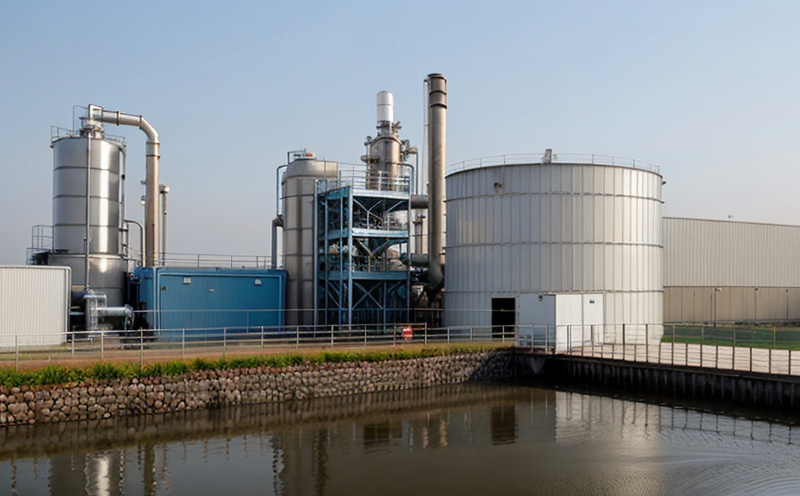EN ISO 15680 Phosphorus Testing in Industrial Wastewater
The European Norm ISO 15680-3:2004 specifies a methodology for the determination of total and available phosphorus content in industrial wastewater. This test is essential for industries that discharge their effluents into water bodies, as it helps ensure compliance with stringent environmental regulations aimed at preserving aquatic ecosystems.
Phosphorus pollution can lead to eutrophication—a process where excessive nutrients cause rapid growth of algae and other organisms, leading to oxygen depletion in the water. This not only affects water quality but also impacts biodiversity, potentially causing harm to fish and other aquatic life forms.
The standard uses colorimetric or spectrophotometric methods for measurement. The procedure involves filtering a representative sample of wastewater through a membrane filter, followed by digestion using an appropriate reagent. After digestion, the solution is analyzed either visually or with a spectrophotometer to determine phosphorus levels according to the specified range.
This testing service plays a pivotal role in industrial manufacturing processes where water reuse and discharge are critical factors. Industries such as food processing, chemical production, and pharmaceuticals often generate significant amounts of wastewater rich in nutrients like phosphorus. Regular monitoring ensures that these industries meet not only local but also international standards for environmental sustainability.
Our laboratory adheres strictly to the ISO 15680 protocol, employing experienced analysts and state-of-the-art equipment to deliver accurate results within a short turnaround time. Understanding the nuances of industrial wastewater testing allows us to tailor our services effectively, ensuring clients receive actionable insights into their water management practices.
By leveraging this expertise, we help companies maintain compliance with environmental regulations while optimizing resource usage and reducing operational costs associated with excess nutrient discharges. Our commitment to precision and reliability ensures that every sample tested contributes valuable data towards sustainable industrial operations.
Why It Matters
The importance of phosphorus testing in industrial wastewater cannot be overstated, especially given the increasing focus on environmental sustainability globally. Regulatory bodies worldwide are implementing stricter guidelines to mitigate pollution from industrial discharges into natural water systems.
Eutrophication: Excessive nutrients like phosphorus can lead to algal blooms that consume oxygen, harming aquatic life.
Water Quality Degradation: Phosphorus contributes significantly to the degradation of water quality, making it unfit for drinking or recreational use.
Health Risks: Contaminated water sources pose health risks to humans and wildlife alike, emphasizing the need for stringent monitoring practices.
Compliance with international standards such as ISO 15680 ensures that industrial facilities operate ethically and responsibly, contributing positively to environmental conservation efforts. By adhering to these norms, companies not only safeguard their reputations but also enhance their marketability in an increasingly eco-conscious world.
Benefits
Implementing phosphorus testing according to ISO 15680 brings numerous advantages for industrial facilities:
Enhanced Compliance: Ensures adherence to local and international environmental regulations, reducing legal risks associated with non-compliance.
Data-Driven Decision Making: Provides actionable insights into water management practices, enabling informed decisions regarding process optimization.
Resource Optimization: Helps identify areas where resource usage can be reduced without compromising production efficiency.
Sustainable Operations: Contributes to long-term sustainability goals by minimizing environmental impact and promoting responsible use of resources.
Incorporating these benefits into daily operations fosters a culture of responsibility among employees, encouraging them to adopt environmentally friendly practices. This holistic approach ensures that industrial facilities remain at the forefront of sustainable development initiatives.
Quality and Reliability Assurance
Our laboratory maintains rigorous quality control measures to ensure accuracy and reliability in all tests conducted under ISO 15680 standards:
Standard Operating Procedures (SOPs): All personnel undergo comprehensive training on the latest SOPs, ensuring consistent application of methods.
Laboratory Accreditation: Our facility is accredited by leading bodies to guarantee adherence to international best practices.
Calibration and Maintenance: Regular calibration checks and maintenance routines are carried out to keep instruments functioning optimally.
Quality Control Samples: Each batch of tests includes quality control samples to verify the precision and accuracy of results.
These stringent protocols not only enhance confidence in our services but also contribute significantly to maintaining high standards across all sectors we serve. Our commitment to excellence is reflected in every aspect of our operations, ensuring that clients receive reliable and accurate data they can trust.





